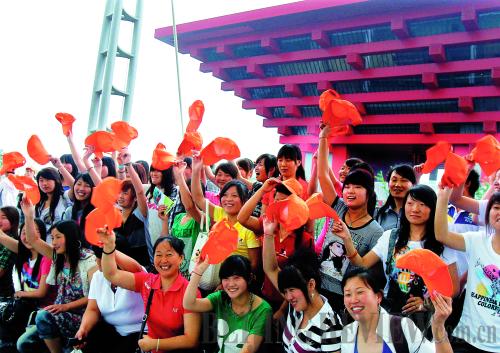|
 |
|
A DAY IN THE LIFE: enjoying World Expo - Shanghai (XINHUA) |
The distance between dream and reality
Li has ambitions for the future. "I hope to own a forklift truck and start my own business, so now I have to make as much money as possible," he says.
The dream of "start[ing] my own business" is held by many post-80s migrant workers. According to the Survey of Living Conditions of the New Generation of Migrant Workers in Shenzhen released in July by the Shenzhen General Labor Union and the Institute of Labor and Social Security Law at Shenzhen University, entrepreneurship is common characteristic found in the new generation. 38.2 percent of the survey's respondents hope to start their own business in one year, more than 10 percentage points higher than the previous generation.
While many young migrant workers dream of becoming their own boss, Lin's dream is to become a real Beijing denizen. "There are opportunities and places for fun everywhere," she says. "In the future I hope I can get married and stay here."
Optimistic as Li and Lin's are, they both feel pressured in big cities. "It's not easy," Li says. "Usually I have to work for around 10 hours a day, sometimes more. Hours are irregular. Quite often I need to work the night shift." He recalled his hardest period in Sichuan Province, where he worked tirelessly all day, eating disgusting food and living out of a tent.
Lin's problems have been more psychological in nature. "At the beginning, I felt it was very difficult to adjust and easily got depressed, especially when I was scolded by the boss and customers. That makes me feel even lonelier and [makes me] miss my family," she says.
Attached to an agricultural hukou in a city, young migrant workers with this dual identity are often called a "rootless generation." They are the main contributors to China's rapid urbanization, but the country's expanding economy doesn't benefit them as much as they benefit it. They face many problems: heavy workloads, high housing prices, poor social security and difficulties integrating into urban life – all high-pressure issues. Since January 2010, 13 workers at Foxconn, the electronics manufacturing giant, have attempted suicide by jumping off company buildings (10 died and 3 were severely injured). This tragedy is a reflection of the plight faced by today's new migrant workers.
Despite their difficulties, young migrant workers are relatively optimistic about what lies ahead. In the Survey of Living Conditions of the New Generation of Migrant Workers in Shenzhen, 83.3 percent of respondents believe things will improve in the future. "Though sometimes I [feel] lost, generally I'm confident about my future. Last year, I passed my exam and received a "Special Machine Operation" certificate, which will be very useful. I believe as long as I make the effort, I will get what I want eventually," says Li.
|